Rapidly plummeting crime rates, an affordable cost of living, and an endless array of activities to enjoy in El Salvador have placed it firmly back on expert expats’ radars. This small Central American country, studded with volcano peaks and fringed by black sand beaches, is home to thriving cities, quaint small towns, and shorefront communities.
Accommodation across El Salvador is inexpensive for expats, with reasonable rates ranging from the high-end neighborhoods of the capital’s colonial downtown to the upmarket new builds that line the coast. Additionally, the country’s official currencies are USD and Bitcoin, making it a convenient option for expats leaving the United States or investing in virtual currencies. With visa restrictions easing and new areas opening up to outsiders, now is the prime time to choose from these options to find your ideal new hometown in El Salvador.
How to Move Out of the U.S.
How to Move Out of the U.S.
In all sorts of beautiful, welcoming, culturally rich, saner places around the world, you can live well from $2,000 a month (all in, housing included). Sign up for our free daily IL Postcards e-letter and we’ll immediately send you a free report on the WORLD’S # 1 RETIREMENT HAVEN— plus 9 more spots you should have on your radar. Each day, you’ll earn about the best places to move to, retire, travel, buy real estate, and enjoy a good life for less, overseas.

By submitting your email address, you will receive a free subscription to IL Postcards, The Untourist Daily and special offers from International Living and our affiliates. You can unsubscribe at any time, and we encourage you to read more about our Privacy Policy.
San Salvador
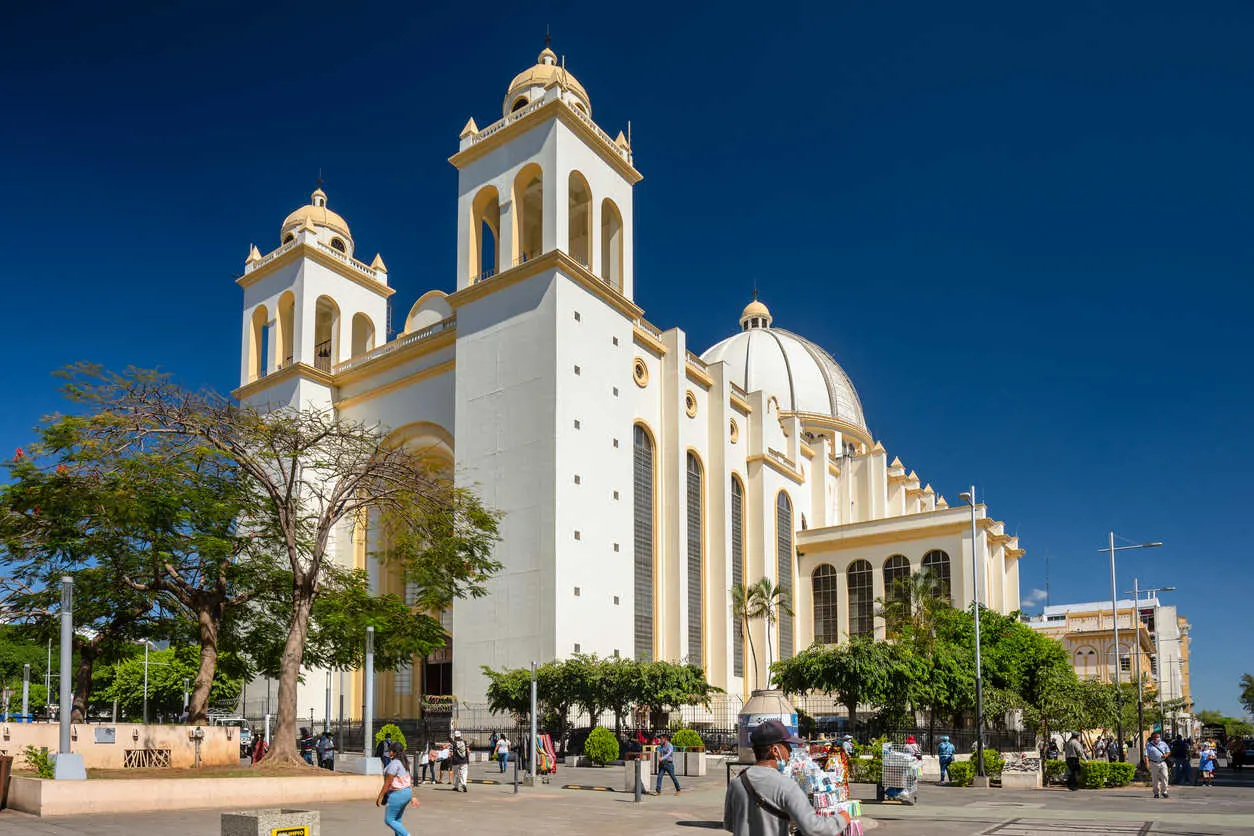
El Salvador’s sprawling capital has been receiving a revamp under the latest government policy changes. Its grandiose colonial center has always borne the trappings of a Latin metropolis—an elaborate white church, an enormous central plaza, and grand government buildings. Yet, the historic center has become an attractive place for relocators since recent renovations have been underway.
“Historically, the best areas for housing have been around Colonia Escalón, San Benito, and Santa Elena,” according to San Salvador native José Guillermo Figueroa. “It’s there that you’ll find most of the bars, restaurants, and hotels.” Though both La Escalón and San Benito are often dubbed as “old money areas” by New Jersey native Connie Arévelo, real estate in these localities has been freeing up as well-to-do San Salvadoreans relocate to the private neighborhoods in Zaragoza and its surroundings.
While rent prices, as well as restaurant and amenity prices, are higher in these neighborhoods than in other parts of the city, expats are paying for the comfort and security of San Salvador’s wealthiest addresses. Indeed, Nicole Allan from Virginia commented on its similarity to the capital of its northerly neighbors: “I love San Benito. It reminds me of home without the craziness.”
“There is also Antiguo Cuscatlán,” Figueroa continues. “A lot of people live there, and its center is known for its pupuserías, restaurants, and the cool vibe cultivated around its central park.” Filled with modern and recently refurbished residential buildings, malls, and infrastructure, the neighborhood offers both the traditional atmosphere of a Salvadorean suburb and the benefits of investment. Expats who take their food seriously should consider Antiguo Cuscatlán, a district hailed for its exceptional, affordable, and traditional street eats.
“Lately, the ‘coolest’ place that has been moving up in the rankings is the recently renewed and beautiful downtown, also called ‘Centro Histórico de San Salvador,’” Figueroa also mentions. The heart of the capital has received more than $55,000,000 in investment as safety risks in the area have dissipated. Sixty-five major investment projects are underway as of 2024, the majority pertaining to lodging, food, and cultural activities, as well as extensive housing development. Though employment and investment rapidly improve the quality of life for residents of the city’s center, rental, and real estate prices are still lower than those found in the historically expensive areas of the city.
Ahuachapán
El Salvador’s western highlands are densely forested, with thickets concealing rushing waterfalls, coffee plantations, and a number of small, charming towns. Ahuachapán, the jump-off or finishing point for travelers taking the scenic Ruta de las Flores, offers easy access to the bucolic west while remaining one of the most significant cities in El Salvador.
Liliana Chavez, who relocated to Ahuachapán from Pennsylvania, cites the city’s access to nature as one of its key points of attraction. “The amazing thermal water, the fresh organic produce, and the weather make it an excellent place to enjoy nature,” she says, adding that the area’s natural beauty is amplified by the sense of safety in the city and the vibrant music scene. “We have everything we need to relax here 24/7,” Chavez adds. She bought her dream El Salvadorean home for around $50,000, and rental rates in Ahuachapán are, on average, 38% lower than in San Salvador, making it ideal for cost-conscious city dwellers seeking proximity to Central America’s wild interior.
Concepción de Ataco
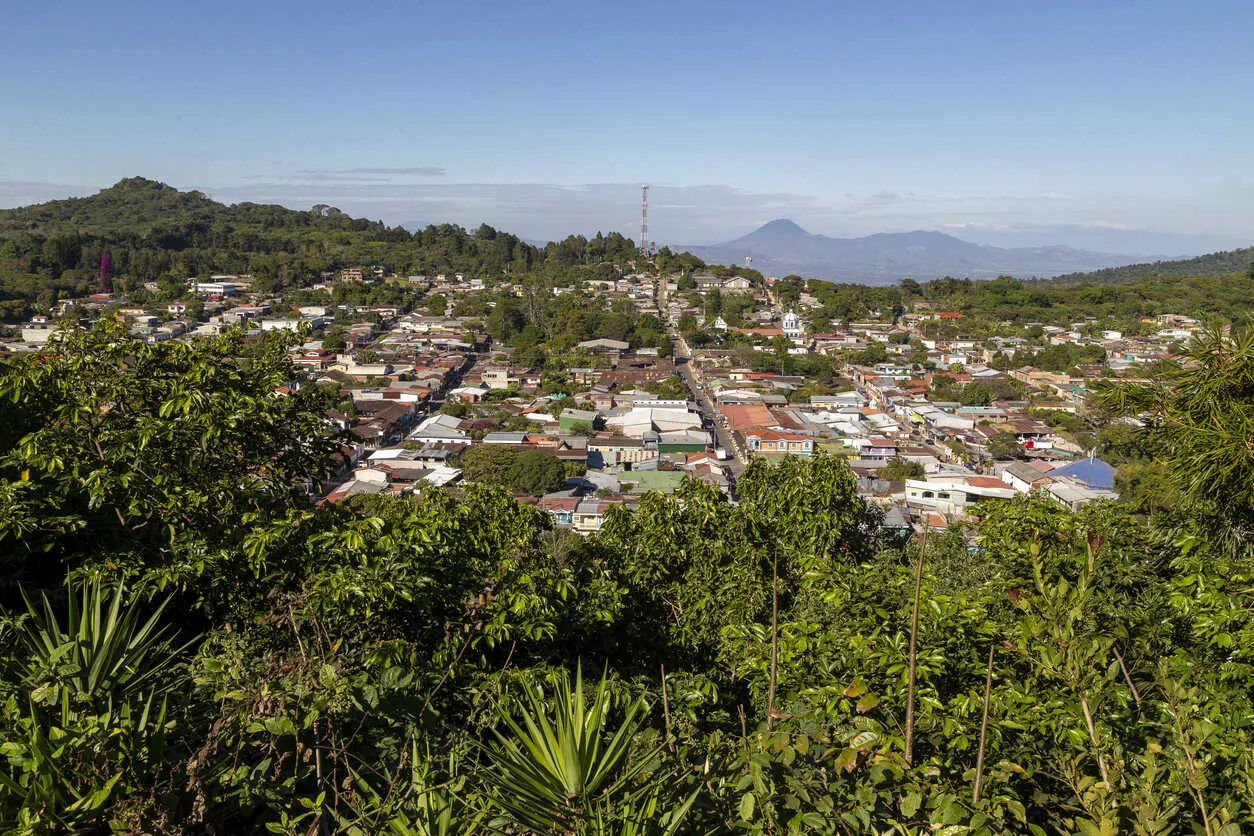
Expats seeking more of a small-town scene should consider Ataco, a quainter stop on the Ruta de las Flores. Its undulating cobble streets, breezy plaza, shops selling local artisanal goods, and sumptuous street food have long attracted tourists from around El Salvador. For Tommy Ernesto Castillo from Los Angeles, California, Ataco ticked all the key boxes.
“It’s a great location for many reasons,” according to Castillo, “but most importantly for the weather, the safety, and the location.” Situated in the midst of the mountains, it is an ideal option for expats opting for tranquil surroundings and safe, walkable streets.
San Juan Opico
Between the bustle of San Salvador and Santa Ana, the town of San Juan Opico is conveniently located for those looking to access the bigger city without the commitment to the smog. Its quiet streets are also a short distance from some of El Salvador’s most interesting historical sites and areas of natural beauty. Long-time resident Cristal Alverenga highlights the fact that its calm center doesn’t have any traffic.
She says, “Though it’s not too central, it’s a great location—we have Quezaltepeque, Apopa, Opico, and Lourdes, which are very close. It really offers everything, and the views are incredible.” Rents rarely rise above a few hundred dollars a month for a house, and potential buyers can scope out the various properties on the market, averaging an asking price of $55,000.
Surf City
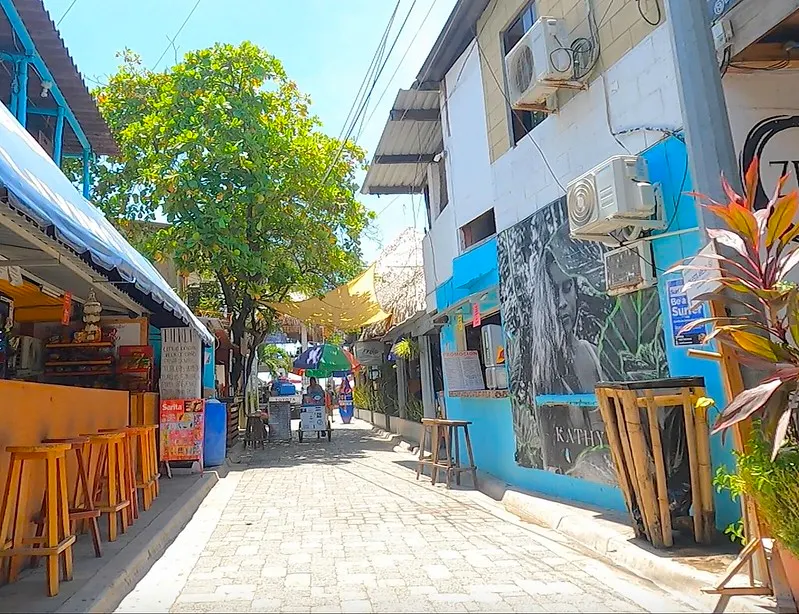
Surf City is less of a city and more a medley of small towns situated on the black sand beaches that line Central America’s Pacific coast. The government has been pouring tourism investment into the area; the International Surfing Association has chosen to host the next world championships there, and planned new malls, hotels, and tourism complexes have begun construction.
Several expat favorites are encompassed within the ‘Surf City’ moniker, including El Tunco, San Blas, El Cuco, and more. Perhaps the best-known is El Tunco. Long a haven for surfers and sun-seekers, the sand-dusted streets of the small town are familiar territory for travelers. With crowds came an increase in tourist infrastructure, particularly in lively bars serving up fresh cocktails shoreside.
It is an ideal option for expats interested in its proximity to some of the best surf in the world, those hoping to find a more multicultural atmosphere, or those seeking a younger ‘digital nomad’ population. Though the small towns of the shoreline don’t have access to big city amenities, it only takes an hour to drive from El Tunco to San Salvador.
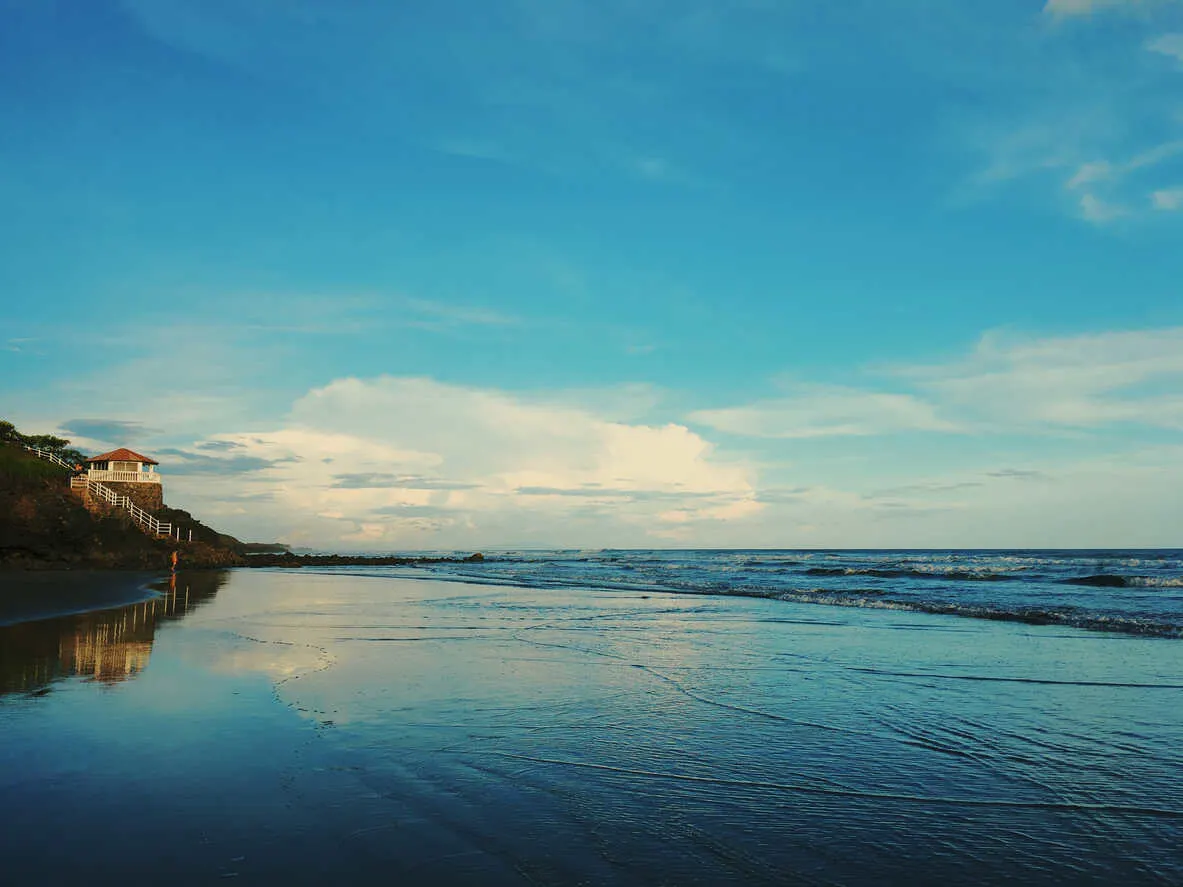
Clusters of ranches and oceanfront properties overlook the black beaches of Isla de San Blas. Expats here watch surfers catching waves from their living room windows, spot nesting turtles wading their way out of the water, and play regular soccer games with locals on the beach. For one resident, Lisa Delcid, an expat from Virginia, the prospective real estate opportunities in Isla de San Blas are a key incentive. “There are lots of lots available to build incredible properties only five minutes’ walk from the beach,” she says, “you can have your own pool or just use the huge community pool and park with grills and cabanas.” A short distance from the more popular tourist towns that line the coast of La Libertad, Isla de San Blas serves as a tranquil hideaway while maintaining access to amenities.
El Cuco in the San Miguel district is less developed than some of its more northern neighbors. It offers expats a more authentic insight into life on the Central American shore and instant access to one of the most popular beaches in El Salvador. Its long, clear beaches are lapped by pleasantly warm waters, and its rocky cliffs are dotted with hiking trails. Its quiet streets best suit active and adventurous expats with an interest in village life.
Though Surf City’s most popular stops are mostly in the La Libertad department, the port city of the same name is also an attractive option for expats who are not opposed to tourist crowds. Living in most of the more tranquil towns that line the coast requires regular visits to La Libertad for access to markets and other amenities. If you choose instead to base in the city itself, prepare to be enticed by fresh seafood each day and to settle in for west coast sunsets each evening. The cost of living is slightly higher here than in the coastal villages further along the highway, but it’s a factor counteracted by the time saved in traffic to access basic small-city benefits.
Zaragoza
Approaching the volcanic ash-stained shores of El Salvador’s Pacific coastline, Zaragoza is a fast-growing expat favorite only 20 minutes from the beaches of Surf City. The small city’s proximity to San Salvador has increased the number of eyes on Zaragoza, which has expanded fast with a number of new building projects being undertaken in recent years.
“Zaragoza’s private neighborhoods such as Tuscania and El Encanto are by far the next best neighborhood to live in the San Salvador-La Libertad area,” assures Joseph Landaverde, who moved from Santa Ana, California, to build an Airbnb in Surf City. A number of the city’s elites have started to migrate from San Salvador’s center to elaborate homes on private estates in Zaragoza. The focus on privacy and exclusivity provides assurances to the residents, maintaining strict safety and security protocols.
Though indicative of the high standard of living in the small city, day-to-day expenses are still slightly cheaper than in the heart of San Salvador. Renters can find a three-bedroom apartment in a safe, private zone for around $2,500 per month.
Santa Ana
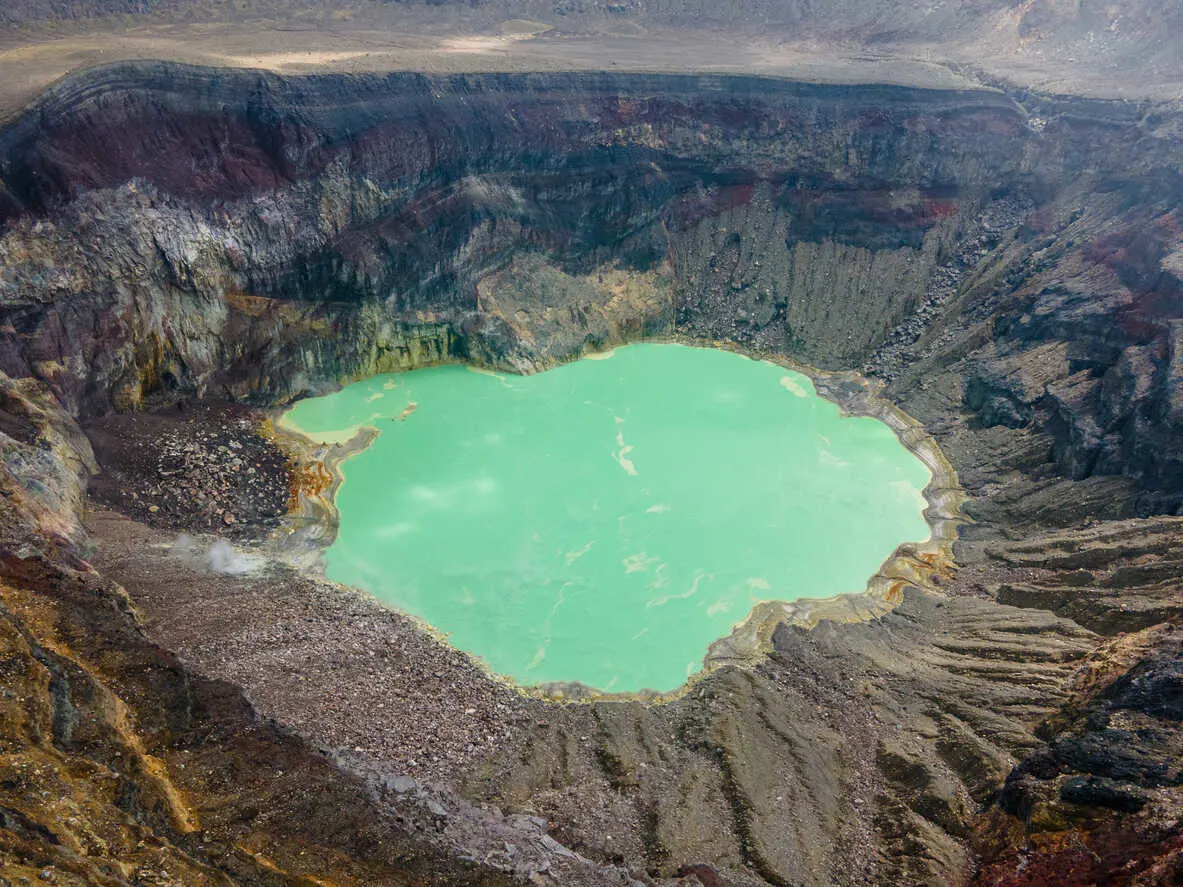
El Salvador’s second-largest city is famed for the eponymous volcano that crowns the caldera. It has long been popular with hikers and nature enthusiasts drawn to the verdant mountains a short distance from the city. Its crowds have also congregated for visits to the country’s only UNESCO World Heritage site, Joya de Cerén.
As such, Santa Ana locals are more familiar with foreign faces, more infrastructure designed for tourists exists, and the level of English spoken is higher. Renters can snare a city-center one-bedroom for around $300 a month or a three-bed for $500. Straying from the inner city, rents drop to $150 per month for one-bedroom apartments.
Santa Tecla
While Santa Tecla technically belongs to San Salvador’s metropolitan area, it has a sense of separation from the capital. Its verdant vegetation and nearby volcano, laneways lined with cafes, bars, and restaurants, and elaborate post-colonial architecture combine to make Santa Tecla an ideal destination for expats with a range of interests.
Formerly designated as the capital of the country’s capital in the 19th century, its streets are replete with historic curiosities, and significant investment has been made over the years into beautifying the downtown. Being one of the more popular options for remote workers, the city has its own coworking facilities, in addition to an excess of quaint cafes offering high-speed Wi-Fi.
It's also a popular choice for families, given its safety levels and proximity to American schools in San Salvador. One of the more expensive locations to live in El Salvador, expats can still expect to spend more than $1,000 in monthly rent for a nice home in the city. This rate can be higher still for expats searching for a furnished property.
Final Thoughts
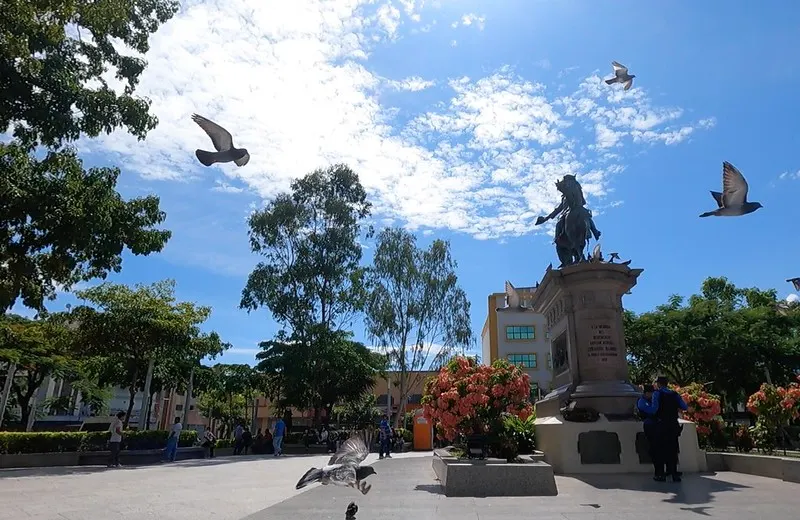
Whether you’re drawn by the low cost of living, the natural beauty, or the growing expat communities, there’s a place in this dynamic country to suit every lifestyle. As El Salvador continues to develop and attract international attention, now is the perfect time to explore what this Central American gem has to offer and consider making it your next home.
How to Move Out of the U.S.
How to Move Out of the U.S.
In all sorts of beautiful, welcoming, culturally rich, saner places around the world, you can live well from $2,000 a month (all in, housing included). Sign up for our free daily IL Postcards e-letter and we’ll immediately send you a free report on the WORLD’S # 1 RETIREMENT HAVEN— plus 9 more spots you should have on your radar. Each day, you’ll earn about the best places to move to, retire, travel, buy real estate, and enjoy a good life for less, overseas.

By submitting your email address, you will receive a free subscription to IL Postcards, The Untourist Daily and special offers from International Living and our affiliates. You can unsubscribe at any time, and we encourage you to read more about our Privacy Policy.
